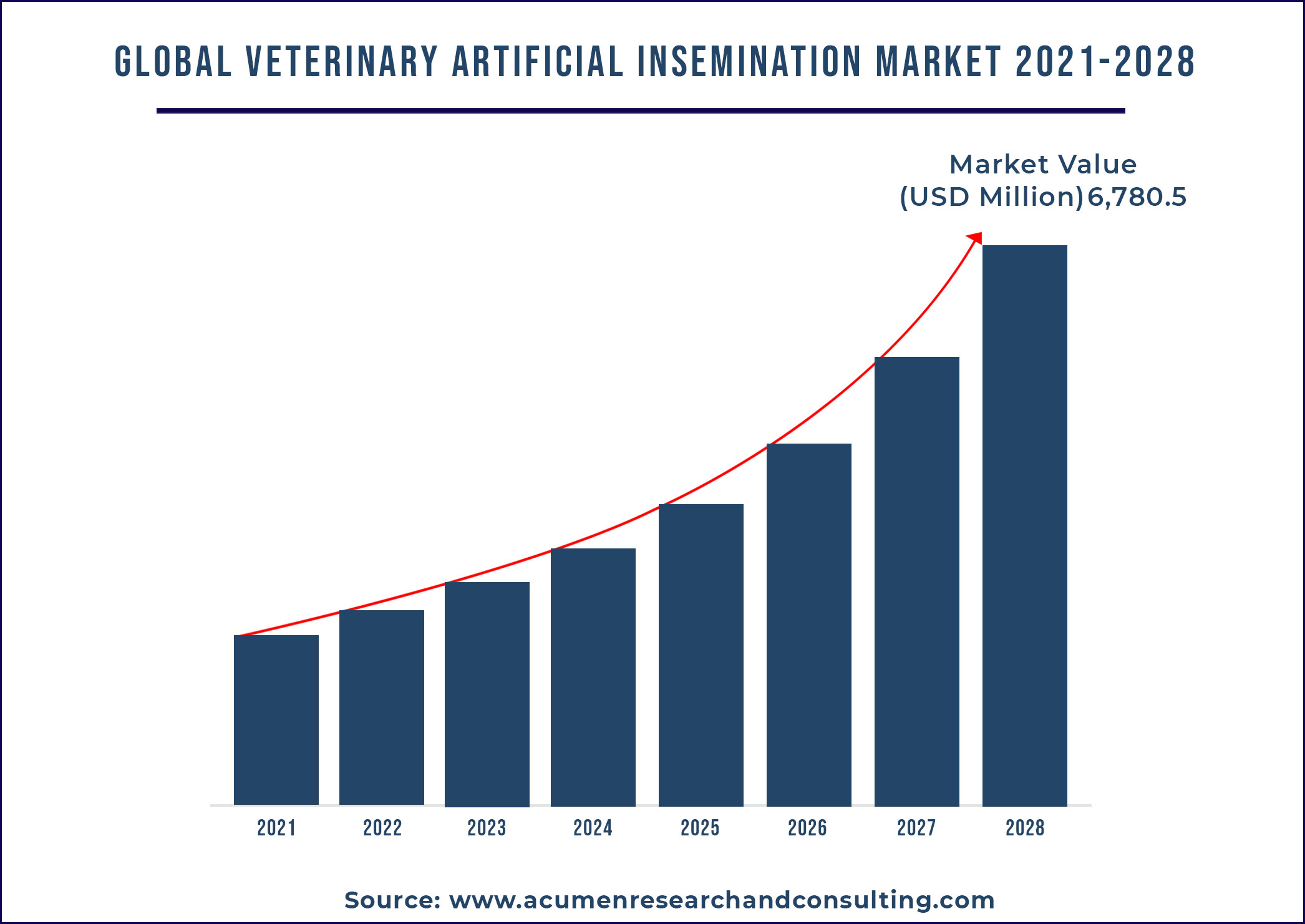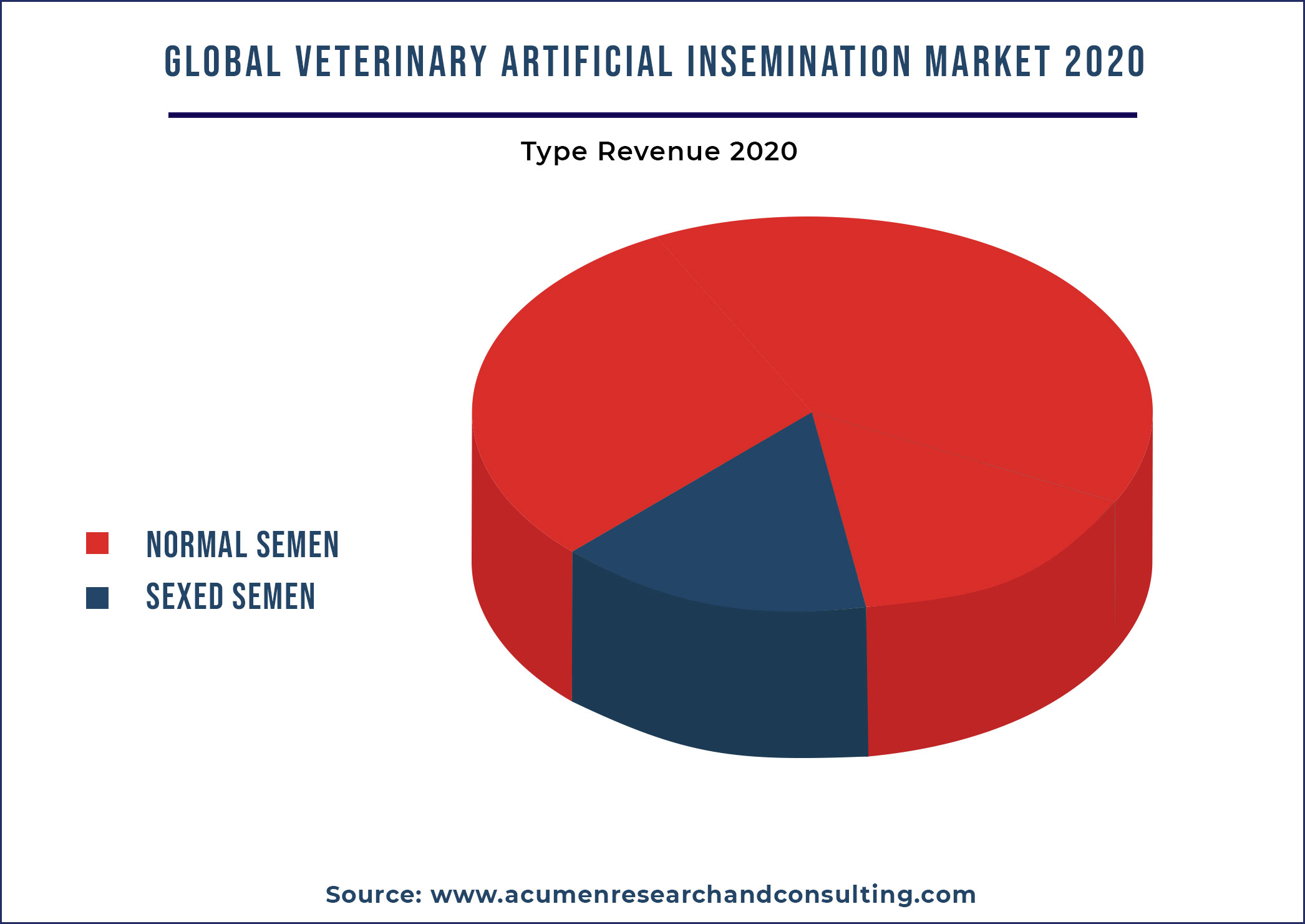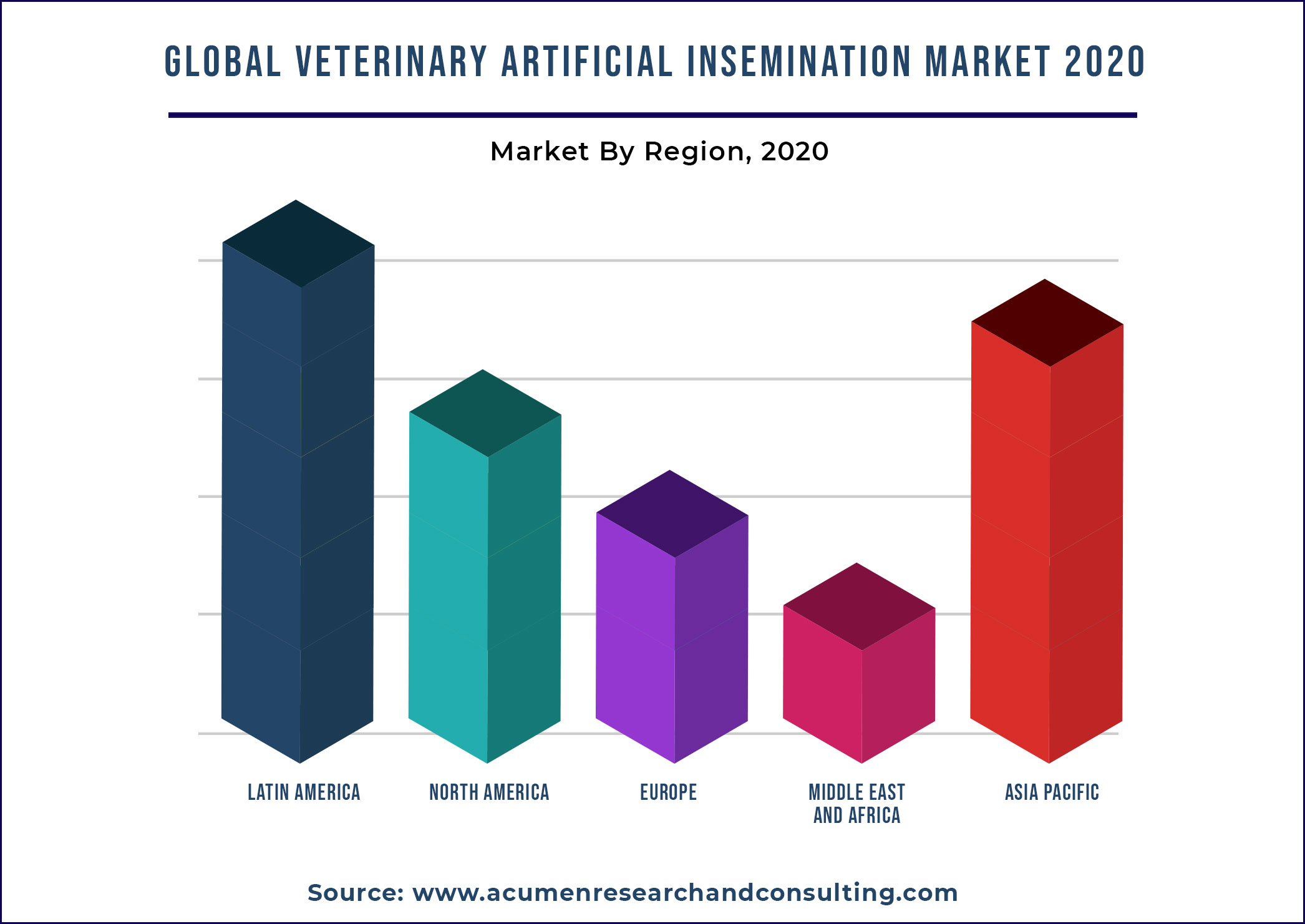Veterinary Artificial Insemination Market | Acumen Research and Consulting
Veterinary Artificial Insemination Market (By Animal Type: Cattle, Swine, Sheep, Canine, Equine, Others; By Product: Normal Semen, Sexed Semen; By End-use: Veterinary Hospitals, Animal Husbandry, Others) - Global Industry Analysis, Market Size, Opportunities and Forecast 2021 - 2028
Published :
Report ID:
Pages :
Format : ![]()
The global veterinary artificial insemination market is expected to grow at a CAGR of around 5.5% from 2021 to 2028 and expected to reach the market value of around US$ 6,780.5 Mn by 2028.

Veterinary artificial insemination (AI) is a method of breeding cattle that involves the use of frozen straws of sperm. It must be done at the correct time of the cow's heat cycle for the process to be successful. AI is a more common procedure that is used as a synchronization protocol to bring the majority of the herd into heat at the same time, allowing cattle to be bred using timed AI. Significant advancements in synchronization techniques have resulted in artificial insemination becoming a much more viable option for today's cattle producers.
Report coverage
| Market | Veterinary Artificial Insemination Market |
| Analysis Period | 2017 - 2028 |
| Base Year | 2020 |
| Forecast Data | 2021 - 2028 |
| Segments Covered | By Animal Type, By Product, By End Use, and By Region |
| Regional Scope | North America, Europe, Asia Pacific, Latin America, and Middle East & Africa |
| Key Companies Profiled | SWINE GENETICS INTERNATIONAL, Select Sires, Inc., SEMEX, GENEX Cooperative, Zoetis Inc., Genus plc, Xcell Breeding & Livestock Services Private Limited, and among others |
| Report Coverage |
Market Trends, Drivers, Restraints, Competitive Analysis, Player Profiling, Regulation Analysis |
| Customization Scope | 10 hrs of free customization and expert consultation |
Market Takeaways:
Laparoscopic artificial insemination (LAI) technique is successful by 60-80% in small ruminants
According to a Frontiers Media S.A. report, laparoscopic artificial insemination is an advanced assisted reproductive technique capable of deep intrauterine semen deposition, which aids in bypassing the physical barriers of the caudal reproductive tract in small ruminants. Pregnancy rates using frozen sperm disposition through intra-uterine have increased by nearly 60-80% when compared to vaginal and TCAI methods. The main advantage of providing LAI technique is that with newer and more portable laparoscopy equipment, it is now possible to offer these services at hospital and field settings at a lower cost. Such factors contribute to the expansion of the global veterinary artificial insemination market.
Market Drivers
Artificial insemination reduces disease transmission is one of the key factors that fosters the growth of global veterinary artificial insemination market
According to an International Atomic Energy Agency (IAEA) report, natural mating frequently results in the transmission of venereal diseases between males and females. While some pathogens can be transmitted in sperm via artificial insemination, the collection process is regulated by proper disease agent screening. Furthermore, collected sperm is routinely checked for quality, which aids in the prevention of problems associated with male infertility. Also contributing to the growth of the veterinary artificial insemination market are the ease of transporting semen, the ability to inseminate multiple females in different geographical locations, and long-term semen storage.
Government involvement and support fuel the growth of global veterinary artificial insemination market
According to the FAO report, with a strong belief that AI, even on a limited scale, could assist developing countries in their cattle breeding plans, and that frozen semen offers lucrative opportunities for the transfer of genetic material with high production potential for building up nucleus herds of improved cattle, the FAO has established an international scheme for donations of frozen bull semen. The scheme's basic concept is to establish a network of foundation stock of first-rate animals. The nucleus herd, which could be located at government farms, cooperatives, or an existing AI station, will produce bulls for use within the recipient country. FAO maintains close contact with both recipients and donors, and assists in the development of realistic projects under the scheme. Currently, the scheme is focused on Asian recipient countries. Such factors have a positive impact on the market's ability to grow exponentially over the forecast period.
Market Segmentation
The global veterinary artificial insemination market is segmented as animal type, product, and end-user. Based on animal type, the market is segmented as cattle, swine, sheep, canine, equine, and others. By product, the market is bifurcated into normal semen and sexed semen. Furthermore, end-user is segmented as veterinary hospitals, animal husbandry, and others.

In terms of animal type, the cattle segment has held the lion's share in the past and is expected to do so again during the forecast period. This is because the discovery that bull sperm can be successfully frozen and stored for indefinite periods of time which has benefited AI in cattle. This is one of the key factors that have a positive impact on segmental growth, ultimately contributing to the overall growth of the veterinary artificial insemination market.
According to product, normal sperm accounted for the majority of revenue in 2020 and is expected to continue this trend throughout the forecast period. Because normal sperm is less expensive than sexed sperm, it has risen to prominence in the global market. Furthermore, normal sperm has a higher fertility rate than sexed sperm, which fuels segmental growth and ultimately contributes to the overall growth of the global veterinary artificial insemination market.
Regional Overview
Asia Pacific records dominant share, Latin America records considerable share in 2020
Asia Pacific has dominated the veterinary artificial insemination market in the past and is expected to do so again during the forecast period. According to an FAO report, extensive use is made of AI sub centers in Asia, which prove beneficial as enabling groups of farmers are brought for demonstration. Apart from that, rising demand for dairy and animal protection fuels the overall growth of the veterinary artificial insemination market. Furthermore, China has the third largest cattle inventory with active participation in artificial insemination technology in farms, which drives revenue growth. These factors have a positive impact on the overall growth of the global veterinary artificial insemination market.

Latin America, on the other hand, recorded a reasonable share in 2020 and will see a similar trend in the veterinary artificial insemination market in the coming years. Artificial insemination reproductive biotechnologies are very useful in Latin American camelids, allowing global use of sperm from breeding males with desirable genetics. Brazil, one of the provinces in Latin America, uses the most advanced veterinary artificial insemination technique and is regarded as one of the provinces' most prominent countries. The United States is another region in North America that uses veterinary artificial insemination on nearly 90% of its dairy cattle population. This is one of the key factors influencing regional growth and, as a result, contributing to the overall growth of the veterinary artificial insemination market.
Competitive Landscape
The prominent players of the global artificial insemination market involve SWINE GENETICS INTERNATIONAL, Select Sires, Inc., SEMEX, GENEX Cooperative, Zoetis Inc., Genus plc, Xcell Breeding & Livestock Services Private Limited, and among others
Market Segmentation
Market By Animal Type
Cattle
Swine
Sheep
Canine
Equine
Others
Market By Product
Normal Semen
Sexed Semen
Market By End-use
Veterinary Hospitals
Animal Husbandry
Others
Market By Geography
North America
• U.S.
• Canada
Europe
• U.K.
• Germany
• France
• Spain
• Rest of Europe
Asia-Pacific
• China
• Japan
• India
• Australia
• South Korea
• Rest of Asia-Pacific
Latin America
• Brazil
• Mexico
• Rest of Latin America
Middle East & Africa
• GCC
• South Africa
• Rest of Middle East & Africa
Frequently Asked Questions
What will be the market value of the veterinary artificial insemination market?
Veterinary artificial insemination market is expected to reach a market value of around US$ 6,780.5 Mn by 2028.
At what CAGR, the veterinary artificial insemination market is expected to grow during the forecast period (2021-2028)?
The veterinary artificial insemination market is expected to grow at a CAGR of around 5.5% from 2021 to 2028.
Which is the leading segment in the veterinary artificial insemination market?
Based on product, normal semen segment is the leading segment in the overall market.
What are the key drivers of the veterinary artificial insemination market?
Government involvement and support is one of the prominent factors that drive the demand for veterinary artificial insemination market.
Which are the prominent players in the veterinary artificial insemination market?
SWINE GENETICS INTERNATIONAL, Select Sires, Inc., SEMEX, GENEX Cooperative, Zoetis Inc., Genus plc, Xcell Breeding & Livestock Services Private Limited, and among others.
Which region held the highest market share in the veterinary artificial insemination market?
Asia Pacific is anticipated to grab the highest market share in the regional market
Which region is expected to be the fastest growing market over the forecast period?
Latin America is expected to be the fastest growing market in the forthcoming years


